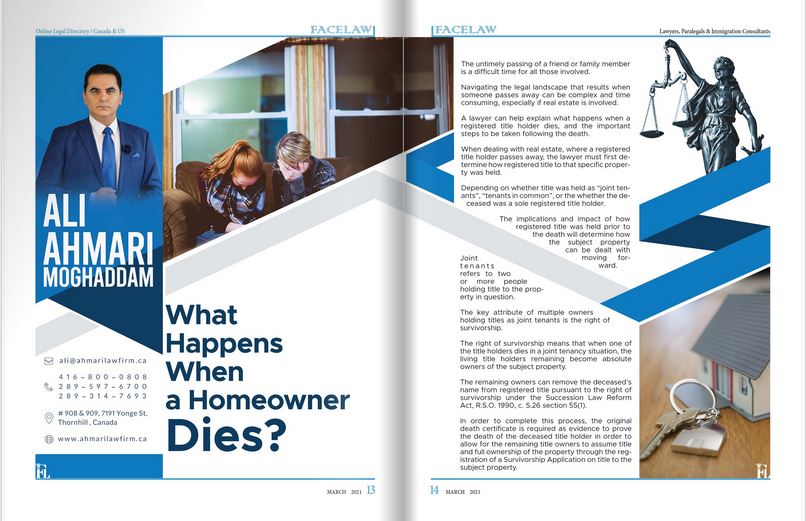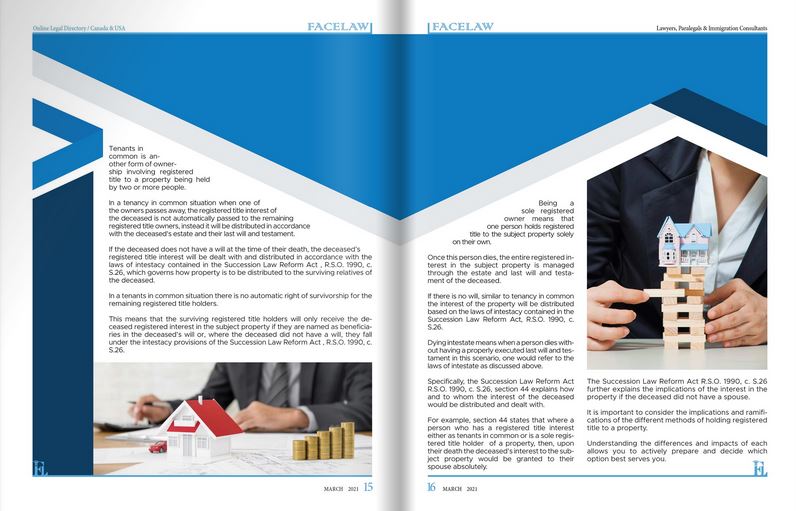What Happens When a Homeowner Dies?
What Happens When a Homeowner Dies?
The untimely passing of a friend or family member is a difficult time for all those involved. Navigating the legal landscape that results when someone passes away can be complex and time consuming, especially if real estate is involved. A lawyer can help explain what happens when a registered title holder dies, and the important steps to be taken following the death. When dealing with real estate, where a registered title holder passes away, the lawyer must first determine how registered title to that specific property was held. Depending on whether title was held as “joint tenants”, “tenants in common”, or the whether the deceased was a sole registered title holder. The implications and impact of how registered title was held prior to the death will determine how the subject property can be dealt with moving forward. .
Joint tenants refers to two or more people holding title to the property in question. The key attribute of multiple owners holding titles as joint tenants is the right of survivorship. The right of survivorship means that when one of the title holders dies in a joint tenancy situation, the living title holders remaining become absolute owners of the subject property. The remaining owners can remove the deceased’s name from registered title pursuant to the right of survivorship under the Succession Law Reform Act, R.S.O. 1990, c. S.26 section 55(1). In order to complete this process, the original death certificate is required as evidence to prove the death of the deceased title holder in order to allow for the remaining title owners to assume title and full ownership of the property through the registration of a Survivorship Application on title to the subject property.
Tenants in common is another form of ownership involving registered title to a property being held by two or more people. In a tenancy in common situation when one of the owners passes away, the registered title interest of the deceased is not automatically passed to the remaining registered title owners, instead it will be distributed in accordance with the deceased’s estate and their last will and testament. If the deceased does not have a will at the time of their death, the deceased’s registered title interest will be dealt with and distributed in accordance with the laws of intestacy contained in the Succession Law Reform Act , R.S.O. 1990, c. S.26, which governs how property is to be distributed to the surviving relatives of the deceased. In a tenants in common situation there is no automatic right of survivorship for the remaining registered title holders. This means that the surviving registered title holders will only receive the deceased registered interest in the subject property if they are named as beneficiaries in the deceased’s will or, where the deceased did not have a will, they fall under the intestacy provisions of the Succession Law Reform Act , R.S.O. 1990, c. S.26.
Being a sole registered owner means that one person holds registered title to the subject property solely on their own. Once this person dies, the entire registered interest in the subject property is managed through the estate and last will and testament of the deceased. If there is no will, similar to tenancy in common the interest of the property will be distributed based on the laws of intestacy contained in the Succession Law Reform Act, R.S.O. 1990, c. S.26.
Dying intestate means when a person dies without having a properly executed last will and testament. In this scenario, one would refer to the laws of intestate as discussed above. Specifically, the Succession Law Reform Act R.S.O. 1990, c. S.26, section 44 explains how and to whom the interest of the deceased would be distributed and dealt with. For example, section 44 states that where a person who has a registered title interest either as tenants in common or is a sole registered title holder of a property, then, upon their death the deceased’s interest to the subject property would be granted to their spouse absolutely. The Succession Law Reform Act R.S.O. 1990, c. S.26 further explains the implications of the interest in the property if the deceased did not have a spouse.
It is important to consider the implications and ramifications of the different methods of holding registered title to a property. Understanding the differences and impacts of each allows you to actively prepare and decide which option best serves you.




Click here for go to Ali Ahmari Moghaddam Page
iranian real estate lawyer in toronto
residential real estate lawyer in canada
farsi speaking real estate lawyers in Canada
iranian real estate lawyers in canada
top commercial real estate lawyers in canada
top real estate lawyer in canada
list of real estate lawyers in canada
real estate lawyer in canada
list of persian real estate lawyers in canada
real estate lawyer in thornhill
residential real estate lawyer in toronto
farsi speaking real estate lawyers in toronto
top commercial real estate lawyers in toronto
top real estate lawyer in toronto
list of real estate lawyers in toronto
real estate lawyer in toronto
list of persian real estate lawyers in toronto
Wills and Estates Lawyer in toronto
list of wills and estates lawyers in toronto
top wills and estates lawyer in toronto
iranian wills and estates lawyer in toronto
persian wills and estates lawyer in toronto
top iranian wills and estates lawyer in toronto
list of persian wills and estates lawyers in toronto
Wills and Estates Lawyer in canada
list of wills and estates lawyers in canada
top wills and estates lawyer in canada
iranian wills and estates lawyer in canada
persian wills and estates lawyer in canada
top iranian wills and estates lawyer in canada
list of persian wills and estates lawyers in canada